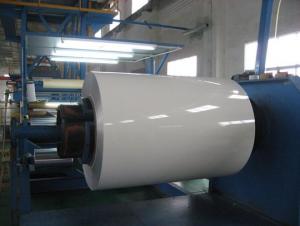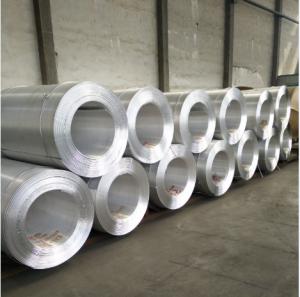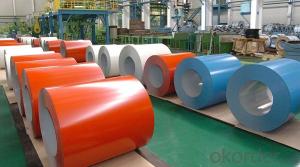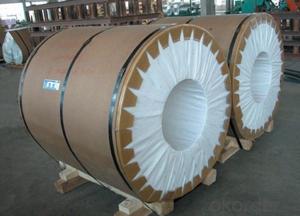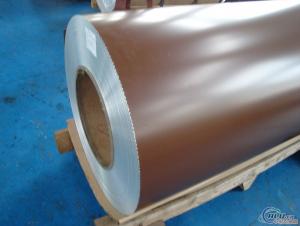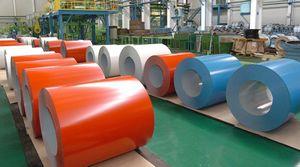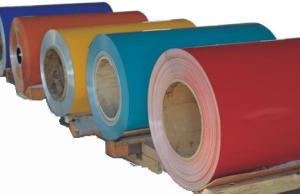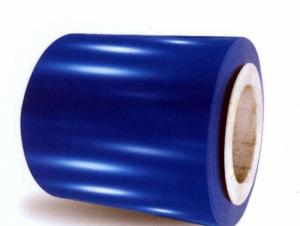York Aluminum Coil PVDF Color Coated Aluminium Coils for Decoration AA3003
- Loading Port:
- China Main Port
- Payment Terms:
- TT or LC
- Min Order Qty:
- -
- Supply Capability:
- -
OKorder Service Pledge
OKorder Financial Service
You Might Also Like
1.Structure of Product Description
PVDF Coated aluminium coils are widly used in decoration field. For the paints, there are two kinds: One is Polyester, and the other is PVDF. The price of PVDF is much higher than PE. However, the period of PVDF will be last longer, it can be remain 15-20 years. Compared to PE, it is 10-15 years.
2. Main features of the product
a.Competitive price---We have our own mills and can produce mill finished aluminium coils, so we can control the production cost better.
b.Professional after-sale service---We have more than 15 years exportation experience and you need not worry about the exporation problems.
c.Fast delivery time---We can control the delivery time within 35 days.
3. Image
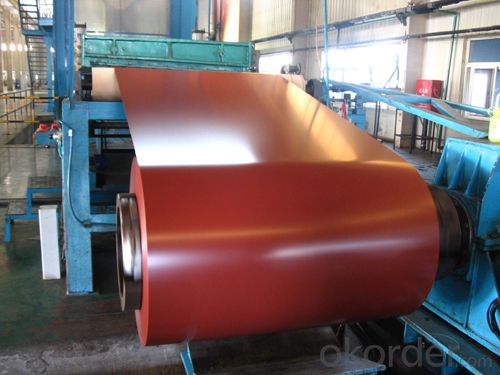
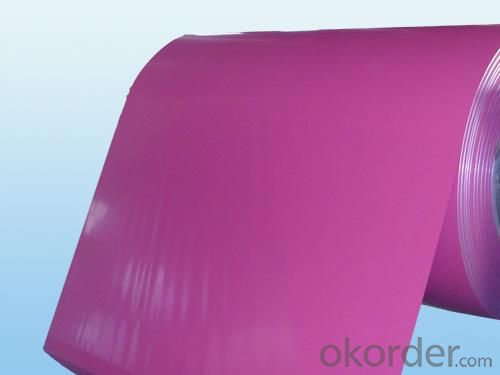
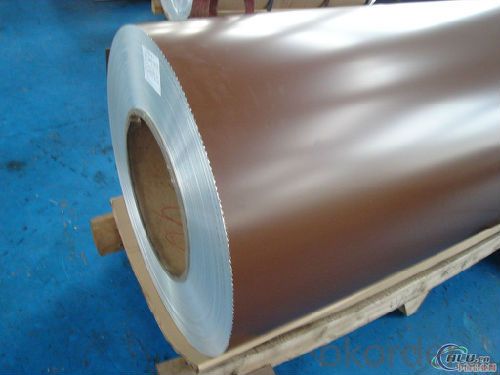
4.Products Specification
| Alloy | Temper | Painting | Coil ID | Coil Weight |
| AA3003 | H14,H16,H18 | PVDF | 508MM | 2-2.5 TONS |
5.FAQ:
What is the quality standard?
---Usually our standard is GB3880-2006
What is the largest width?
---It is 2300mm
What is the MOQ?
---Usually we can accept 80 tons.
- Q: Aluminum metal reacts with hydrochloric acid, HCl, to form hydrogen gas (H2) and a solution of aluminum chloride. Write and balance the equation. Can someone help I just dont get this Al2 + 6HCl → 3H2 + 2AlCl3 Al2 + 2HCl → H2 + 2AlCl 2Al + 6HCl → 3H2 + 2AlCl3 Al + 2HCl → H2 + AlCl2 6Al + 2HCl → H2 + 2Al3Cl
- Aluminum And Hydrochloric Acid
- Q: Can aluminum coils be welded or joined together?
- Aluminum coils have the capability to be welded or connected together. Welding is a widely used approach for joining aluminum coils, especially in industries like automotive, aerospace, and construction. Multiple welding techniques, including TIG (tungsten inert gas) welding, MIG (metal inert gas) welding, and spot welding, can be utilized. These techniques enable the formation of robust and resilient connections between aluminum coils. Moreover, depending on the specific application needs, alternative joining methods like adhesive bonding or mechanical fastening can also be employed. By utilizing the appropriate welding or joining technique, aluminum coils can be effectively and securely joined together.
- Q: What is the hardness range of aluminum coils?
- The hardness range of aluminum coils can vary depending on the specific alloy and temper. Aluminum coils can be produced in a wide range of hardness levels, from very soft to very hard. The hardness of aluminum is often measured using the Rockwell or Brinell hardness scales. Soft aluminum coils typically have a lower hardness range, ranging from 20 to 40 on the Rockwell scale. These soft coils are commonly used in applications where flexibility and formability are important, such as packaging, insulation, and electrical wiring. Hard aluminum coils, on the other hand, have a higher hardness range, typically ranging from 40 to 70 on the Rockwell scale. These coils are more rigid and have better mechanical properties, making them suitable for applications that require strength and durability, such as automotive parts, construction materials, and aerospace components. It is important to note that the specific hardness range of aluminum coils can also be influenced by factors such as the rolling process, heat treatment, and alloy composition. Therefore, it is always recommended to consult the manufacturer or supplier for the specific hardness range of the aluminum coils being considered for a particular application.
- Q: What are the different packaging weights available for aluminum coils?
- The available packaging weights for aluminum coils vary depending on specific requirements and applications. Aluminum coils can be packaged in a range of weights, typically measured in pounds or kilograms. The specific packaging weight depends on factors such as coil size, thickness, and the quantity needed by the customer or industry standards. For larger industrial applications, common packaging weights for aluminum coils can range from as low as 500 pounds (or 227 kilograms) to several thousand pounds (or several metric tons). These weights guarantee secure and efficient transportation and storage, as well as easy handling and loading. It is worth mentioning that the packaging weight of aluminum coils can be customized to meet specific needs. Manufacturers and suppliers often collaborate closely with customers to determine the most suitable packaging weight based on transportation requirements, storage space limitations, and industry regulations. In conclusion, the packaging weights for aluminum coils are flexible and can be personalized to meet individual needs, ensuring safe and convenient handling while satisfying the demands of different industries.
- Q: What are the common sizes and dimensions of aluminum coils?
- Aluminum coils come in various sizes and dimensions, which are determined by the particular industry and application they are used in. While there are common dimensions that are used across different industries, specific requirements may vary. In the building and construction industry, aluminum coils are typically available in widths ranging from 24 inches (609.6 mm) to 60 inches (1524 mm). The thickness of these coils can vary from 0.019 inches (0.48 mm) to 0.032 inches (0.81 mm), although thicker gauges may be available for specialized applications. For the transportation industry, particularly in the manufacturing of automobiles and aircraft, aluminum coils are generally wider and thicker. Widths can range from 48 inches (1219.2 mm) to 72 inches (1828.8 mm), and thicknesses can vary from 0.035 inches (0.89 mm) to 0.125 inches (3.18 mm). In the food and beverage industry, where aluminum is commonly used for packaging purposes, the dimensions of aluminum coils tend to be smaller. Widths can range from 12 inches (304.8 mm) to 24 inches (609.6 mm), and thicknesses are usually around 0.006 inches (0.15 mm) to 0.020 inches (0.51 mm). It is important to keep in mind that these dimensions are not exhaustive and may differ based on the manufacturer and specific requirements of the application. Therefore, it is always advisable to consult with suppliers or manufacturers to determine the most suitable sizes and dimensions for your specific needs.
- Q: Are aluminum coils suitable for food processing applications?
- Yes, aluminum coils are suitable for food processing applications. Aluminum is a non-toxic and corrosion-resistant material, making it safe for direct contact with food. It also has excellent heat conductivity, allowing for efficient heating and cooling processes in food processing. Additionally, aluminum coils are easy to clean and maintain, making them a popular choice in the food industry.
- Q: Can aluminum coils be used in marine applications?
- Marine applications can indeed utilize aluminum coils. The popularity of aluminum in this field can be attributed to its remarkable resistance to corrosion, lightweight nature, and impressive strength-to-weight ratio. Boats, ships, and other marine structures are commonly constructed using aluminum due to these advantages. Specifically, aluminum coils are especially valuable in marine applications because they can be easily shaped and sized to fit different marine industry parts and components. Moreover, these coils possess the ability to endure harsh marine environments and exhibit exceptional resistance to corrosion caused by saltwater, a major concern in marine applications. All in all, the utilization of aluminum coils in marine applications is a dependable and efficient choice.
- Q: Can aluminum coils be used for insulation purposes?
- No, aluminum coils cannot be used for insulation purposes as aluminum is a conductor of heat and does not possess insulating properties.
- Q: Is it possible to utilize aluminum coils for the purpose of storage?
- <p>Yes, aluminum coils can be used for storage, particularly in industrial settings. They are often used for storing materials such as paper, plastic films, and other coilable products. Aluminum coils are lightweight, corrosion-resistant, and can be easily transported and handled. They are also recyclable and environmentally friendly. However, their suitability for storage depends on the specific application and the type of material being stored. It's important to ensure that the coils are stored in a dry, clean environment to prevent damage and maintain their integrity.</p>
Send your message to us
York Aluminum Coil PVDF Color Coated Aluminium Coils for Decoration AA3003
- Loading Port:
- China Main Port
- Payment Terms:
- TT or LC
- Min Order Qty:
- -
- Supply Capability:
- -
OKorder Service Pledge
OKorder Financial Service
Similar products
Hot products
Hot Searches
Related keywords
